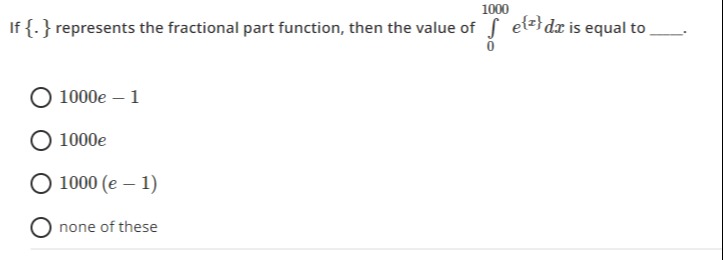Question
Question: If $\{.\}$ represents the fractional part function, then the value of $\int_{0}^{1000} e^{\{x\}} dx$...
If {.} represents the fractional part function, then the value of ∫01000e{x}dx is equal to ____.

1000e - 1
1000e
1000 (e - 1)
none of these
1000 (e - 1)
Solution
To evaluate the integral ∫01000e{x}dx, we use the properties of the fractional part function and definite integrals.
The fractional part function {x} is defined as {x}=x−⌊x⌋, where ⌊x⌋ is the greatest integer less than or equal to x. The function {x} is periodic with a period of 1. This means {x+1}={x}. Consequently, the function f(x)=e{x} is also periodic with a period of 1. e{x+1}=e{(x+1)−⌊x+1⌋}=e{x+1−(⌊x⌋+1)}=e{x−⌊x⌋}=e{x}.
For a periodic function f(x) with period T, the property of definite integrals states that ∫0nTf(x)dx=n∫0Tf(x)dx. In this problem, f(x)=e{x}, the period T=1, and the upper limit of integration is 1000, which can be written as 1000×1. So, n=1000.
Applying this property:
∫01000e{x}dx=1000∫01e{x}dxNow, we need to evaluate the integral over one period, i.e., ∫01e{x}dx. For x∈[0,1), the fractional part {x} is simply equal to x. So, the integral becomes:
∫01e{x}dx=∫01exdxThis is a standard integral:
∫01exdx=[ex]01=e1−e0=e−1Substitute this result back into the main expression:
∫01000e{x}dx=1000(e−1)